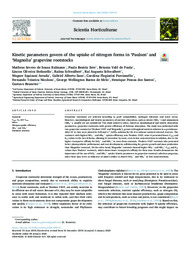Kinetic parameters govern of the uptake of nitrogen forms in "Paulsen" and "Magnolia" grapevine rootstocks.
Kinetic parameters govern of the uptake of nitrogen forms in "Paulsen" and "Magnolia" grapevine rootstocks.
Author(s): KULMANN, M. S. de S.; SETE, P. B.; PAULA, B. V. de; STEFANELLO, L. O.; SCHWALBERT, R.; SCHWALBERT, R. A.; ARRUDA, W. S.; SANS, G. A.; PARCIANELLO, C. F.; NICOLOSO, F. T.; MELO, G. W. B. de; SANTOS, H. P. dos; BRUNETTO, G.
Summary: Grapevine rootstocks are selected according to graft compatibility, pathogen tolerance and water stress. However, morphological and kinetic parameters of nutrient absorption, such as nitrate (NO3 −) and ammonium (NH4 +), usually are not considered. The study aimed to select, based on morphological and kinetic absorption parameters, grapevine rootstocks with greater efficiency of N-forms absorption. The study was performed with two grapevine rootstocks (?Paulsen 1103? and ?Magnolia?), grown in Hoagland nutrient solution in a greenhouse. After 21 d, they were placed in 0.05 mol L-1 CaSO4 solution for 20 d to exhaust nutrient internal reserves. The rootstock with highest NO3 − and NH4 + uptake efficiency was ?Paulsen 1103?, since it presented lower Cmin and Km values in the two N forms, allowing N extraction by roots, even in low concentrations in solution, due to the higher transporter affinity for NO3 − and NH4 + in roots from rootstock. ?Paulsen 1103? rootstock also presented better photosynthetic performance and root development, collaborating for greater growth and mass production than 'Magnolia' rootstock. On the other hand, ?Magnolia? rootstock showed higher NO3 − and NH4 + Cmin and Km values than ?Paulsen? rootstock, which shows lower transporters affinity for these ions. Results demonstrate the importance of the use of NO3 − and NH4 + uptake kinetic parameters in grapevine rootstock selection programs, since these may serve as indicator of plant's ability to absorb NO3 − and NH4 + in low concentrations.
Publication year: 2020
Types of publication: Journal article
Unit: Embrapa Grape & Wine
Keywords: Cmin, Influx, Km and Vmax, NO3 and NH4, Nitrogen uptake efficiency, Rootstock selection
Observation
Some of Embrapa's publications are published as ePub files. To read them, use or download one of the following free software options to your computer or mobile device. Android: Google Play Books; IOS: iBooks; Windows and Linux: Calibre.
Access other publications
Access the Agricultural Research Database (BDPA) to consult Embrapa's full library collection and records.
Visit Embrapa Bookstore to purchase books and other publications sold by Embrapa.

